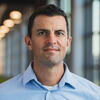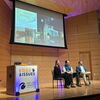Processing Your Payment
Please do not leave this page until complete. This can take a few moments.
- News
-
Editions
View Digital Editions
Biweekly Issues
- December 1, 2025
- Nov. 17, 2025
- November 03, 2025
- October 20, 2025
- October 6, 2025
- September 22, 2025
- + More
Special Editions
- Lists
- Viewpoints
-
Our Events
Event Info
Award Honorees
- Calendar
- Biz Marketplace
Back in the fold | A conversation with former Maine tech czar Janet Yancey-Wrona on life in the private sector
After working in the public sector for seven years as the state's leading scientist - first as director of the Maine Technology Institute and then as head of the Office of Innovation - Janet Yancey-Wrona returned to the private sector in 2006. She took a job with Aiko Biotechnology Inc., a start-up founded by scientists Edward Bilsky, a University of New England pharmacology professor, and Wolfgang Sadee, an academic in Ohio.
In the first two years, the Portland-based company obtained just under $1 million of seed money — enough to push its patented drug compound, an oral treatment for pain called Aiko-150, closer to human trials. Now Yancey-Wrona calls 2008 a "make-or-break" year, when the company will strive to land a pharmaceutical licensing deal and complete successful drug experiments on humans.
Mainebiz recently sat down with Yancey-Wrona to discuss the rigors of FDA approval, the challenges and opportunities in the public sector, and the future for biotechnology scientists in Maine. The following is an edited transcript.
Mainebiz: Are you working partly as a scientist now, as well as doing business development work?
Janet Yancey-Wrona: I am the chief operating officer and there are only two and a half paid employees at the company: myself, the research technician in the lab, and we have a part-time research technician. So my job is really managing the day-to-day activities of the company. A lot of drug development is outsourced because of the regulatory issues, so I manage all of those relationships: manufacturing relationships, relationships with FDA consultants and clinical consultants. I am also principal investigator of several grants. I also oversee the research technicians' reports to me, but Ed and Wolfgang, who are the founding scientists, this is their field. This is not my field, so I know enough to help guide the experiments.
What are the drugs you're developing?
We're developing novel treatments for pain and addiction. And specifically it's based on an understanding of opiate receptor pharmacology that Ed and Wolfgang have been really publishing on for more than a decade, about 15 years. And as a result of their academic research, they realized there are compounds that would be able to either treat various addictions or be combined with opiate drugs, which are used for pain relief, to make a safer, more efficacious pain relief. So we're looking at being able to broaden the markets for opiates, as well as relieving some of the safety and discomfort issues that are associated with long-term opiate use, as well as creating stand-alone products to treat addictions abuse.
How close are you to getting FDA approval?
It takes $50 million and probably about 10 years to get a drug once you start human trials, so we are close to human trials, which in itself is a big step. We came into this at a time when Ed and Wolfgang had years of academic research to back this up. We then as a company received a Maine Technology Institute award as well as a Small Business Innovation Research grant, so we're continuing to work in the laboratory with some of that grant money, as well as what we raised in the seed round, to validate what Ed and Wolfgang have hypothesized in their academic research. We need to validate that in more of a commercial model, or with more of a commercial endpoint in mind.
What was the total you raised for seed money?
All together with the grants, I think we raised just under a million. We got over $600,000 in private seed funding, and then Phase 1 SBIR and the MTI award. Those are good accomplishments, because without that we wouldn't have been able to do work for a year, and I wouldn't have been able to be hired by the company.
When you were working in the public sector, did you always keep your eye out for chances to jump back into the private sector?
Any companies that were starting up in the technology sector, I won't say they all come through MTI, but many do, and so we would see quite a lot of companies. I wasn't always looking for a job, but I would get particularly interested in biotech companies because of my background. But [Aiko] came along with some strong science already behind it, but not too far along either, and it just seemed really interesting. Years and years ago it was always my dream to work for a drug development company. And when the opportunity presented itself, I had to really think about whether I wanted to stop doing what I was doing, because I really liked my public sector work. There were aspects of it that I didn't like, but there are aspects of any job that you don't like.
How does working in the public sector compare to working in the private sector?
I think the biggest challenges and one of the biggest differences is that my job in the public sector, especially as director of the Office of Innovation and also as science advisor to Gov. [John] Baldacci, I was called upon …to weigh in with an opinion on a myriad of topics. I would really have to be the resident expert on biofuels one day and composite materials the next day, and maybe biotech the next day. And that was difficult because you're not an expert, there's no way to be expert in all of those things. So you do miss things, and you do have to rely on what people are presenting to you.
The advantage of what I'm doing now is it's so much more focused, even though I do a lot of different things for the company. There's one goal: We need to make money at the end of it. At the same time what I miss now about my old job is that larger purpose. I interacted with a lot of people and that was great. And it was really interesting to get to see all the cool stuff that was going on in the other sectors, you know, the composite material being used in shipbuilding in Maine, to see it building on a traditional industry we had in Maine. I would have had no reason to learn about that other than being in my job.
My current job I really like, because as chief operating officer, I really have my hands in every aspect of the company. My day-to-day activity is quite varied and still involves a lot of relationship building, as well as evaluating science, reading journal articles. So I think the job I have now is the perfect mix of focus and variety to keep me interested.
What did you bring from your experience working in the public sector that particularly helped you in your role now?
The public sector and private sector are not all that different. People are people. And at MTI, I was the founding president. It was basically starting an organization from scratch. Granted I didn't have to do fundraising in the traditional sense — we had to justify our funding to the Legislature. But everything else I had to do: I had to hire staff, I had to order the trash cans, you know, and that is similar to what you would do with the starting up of any company.
How do business people view experts who work in the public sector?
There is definitely a concern about staying in the public sector too long. Despite my feeling that there really is not much difference between the public sector and the private sector, people perceive that there is. And I was starting to get concerned as I was getting to seven, eight years in the public sector that you start to look at my resume and I've only had three years at Idexx and seven years in the public sector. How attractive am I to the private sector? Just because of the perception that others have, that, "Oh you're used to bureaucracy." So I am glad this came along when it did.
I hear all kind of things; there are people who don't think people in the public sector work hard, which is ridiculous because there are a lot of very hard-working people. I think people have a very different idea of what working for a state or a government is compared to working for a private company. Basically you're not focused on the bottom line, which is true. You're not focused on the bottom line when you're in economic development. Your bottom line is not to make money for the company, your bottom line is to create jobs for the state, balance political interests, have geographic prosperity.
Now that you've worked for MTI, the Office of Innovation and Aiko, what changes have you seen in Maine's biotech sector?
The biggest change I'm really pleased to see is we were able to vote on and pass a large bond issue this past year. What I learned working for the state is we try to do a lot and we underfund everything. Because if you pick one or two things, then a whole bunch of people are left out. The problem with trying to pick everything is no one gets the resources they really need to make a difference. So I'm glad to see a bond, although I would suggest it's still not enough. But at least we're starting to get into the right order of magnitude. Of course most states have that size bond just going to one sector.
But I think the big problem in Maine is still critical mass. And my opinion, both from what I see now as well as from my past experience, is we don't have large anchor companies that spin-off people so that they're around. What you want is the innovation center of the industry because those are the kind of people you want spinning out and working in your economy. I mean we have Idexx, and we have some other companies that are decent sized, but where you really find a thick labor market, if you will, is when you have multiple large companies together. And we as a state do not do anything to attract large companies in this area.
Does Maine have a chance to attract big biotech companies?
If they put some resources toward it. At my other job I had been in discussion with a biotech company that would have come here. The government of Scotland is offering them $50 million and a building, so they said, "Fine, we'll build our research center there around your university." And we'll never do that.
Do you think you'll be in the private sector for the long haul?
Whenever I make a career change I think about what doors will open and what will close, and my concern about Maine is that there isn't a lot of other biotech.
So hopefully I'm acquiring a good skill set, I'll be able show I managed a company in the private sector, and that we've been successful. Hopefully we'll make a lot of money and I'll be able to stay with the company for a long time. If not, if I make a lot of money and end up leaving the company, then hopefully I'm in a position to choose what I want to do. If I don't make a lot of money and something happens to the company, then hopefully I'll have gained some skills that will allow me to still stay in Maine. But my biggest concern is how I will stay here.
Mainebiz web partners

The Giving Guide
The Giving Guide helps nonprofits have the opportunity to showcase and differentiate their organizations so that businesses better understand how they can contribute to a nonprofit’s mission and work.
Learn More
Work for ME
Work for ME is a workforce development tool to help Maine’s employers target Maine’s emerging workforce. Work for ME highlights each industry, its impact on Maine’s economy, the jobs available to entry-level workers, the training and education needed to get a career started.
Learn More
Groundbreaking Maine
Whether you’re a developer, financer, architect, or industry enthusiast, Groundbreaking Maine is crafted to be your go-to source for valuable insights in Maine’s real estate and construction community.
Learn more-
The Giving Guide
The Giving Guide helps nonprofits have the opportunity to showcase and differentiate their organizations so that businesses better understand how they can contribute to a nonprofit’s mission and work.
-
Work for ME
Work for ME is a workforce development tool to help Maine’s employers target Maine’s emerging workforce. Work for ME highlights each industry, its impact on Maine’s economy, the jobs available to entry-level workers, the training and education needed to get a career started.
-
Groundbreaking Maine
Whether you’re a developer, financer, architect, or industry enthusiast, Groundbreaking Maine is crafted to be your go-to source for valuable insights in Maine’s real estate and construction community.
ABOUT
NEW ENGLAND BUSINESS MEDIA SITES
No articles left
Get access now
In order to use this feature, we need some information from you. You can also login or register for a free account.
By clicking submit you are agreeing to our cookie usage and Privacy Policy
Already have an account? Login
Already have an account? Login
Want to create an account? Register
Get access now
In order to use this feature, we need some information from you. You can also login or register for a free account.
By clicking submit you are agreeing to our cookie usage and Privacy Policy
Already have an account? Login
Already have an account? Login
Want to create an account? Register







Comments